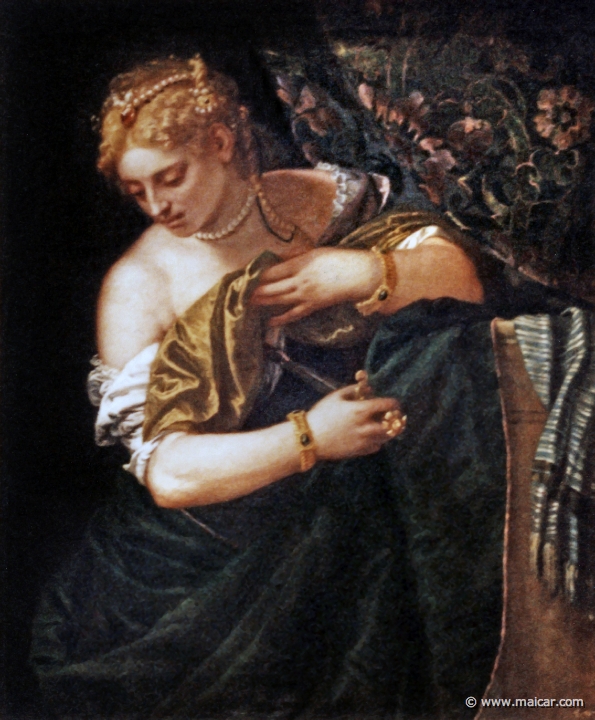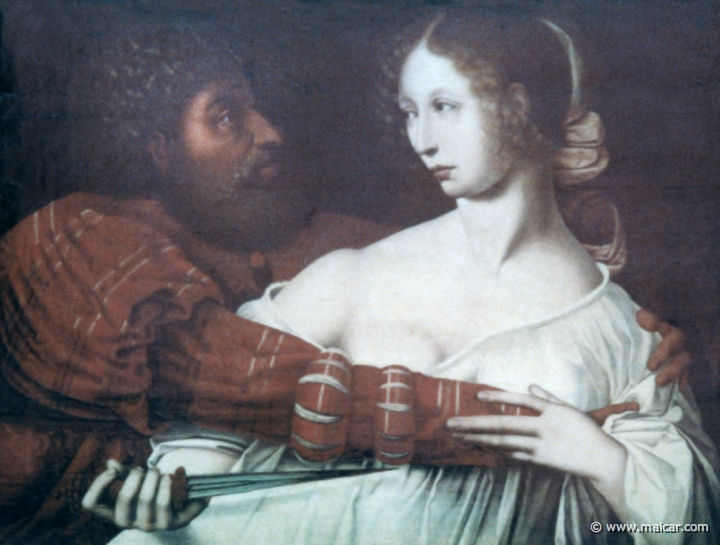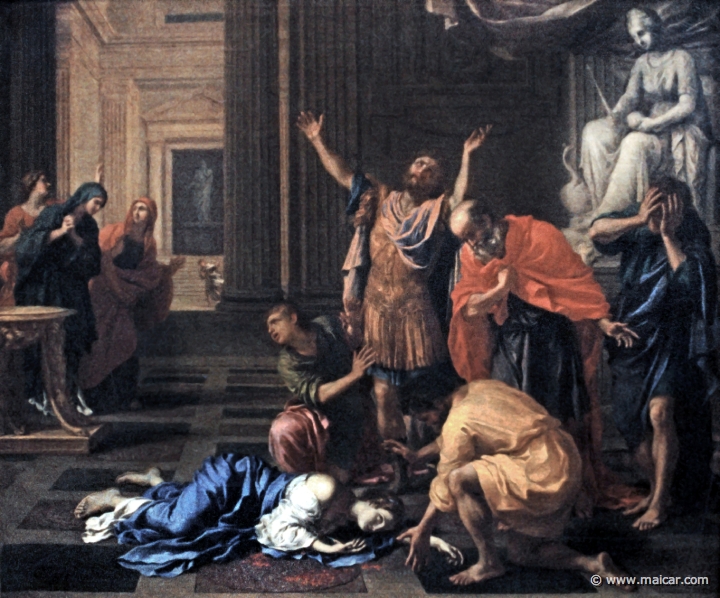|

|
Lucretia 2 plunging a knife into her heart. 0607: Paolo Veronese, 1528-1588: Lucrezia (1580-83). Künsthistorische Museum, Wien.
|
|
Lucretia 2 was raped by a prince of Rome, and after confessing her misfortune to her husband and father, stabbed herself to death, despite all their efforts to comfort her.
Kings of Rome (I)
Romulus, the founder of Rome, was also this city's first king, reigning first alone and afterwards sharing the rule with King Tatius of the Sabines, his former enemy. When they were both dead, there was an interregnum during which collective rule prevailed. When the interregnum was over, Numa 3, son of the illustrious Sabine Pompon 1, came to the throne; and when Numa 3 died of Old
Age, he was succeeded by Tullus Hostilius, known for having waged war against the Albans. After him, Ancus Marcius, who is remembered as the founder of Rome's harbor Ostia and was the grandson of Numa 3, became king of Rome.
Kings of Rome (II), and husband of Lucrecia 2
It was during the reign of Ancus Marcius that Lucumo 2, later known as Tarquinius Priscus, came to Rome, putting his wealth and energy at his own ambition's service until in time he came to the throne and succeeded Ancus Marcius. Tarquinius Priscus was son of Demaratus of Corinth, who had left his country on account of political troubles. Demaratus had yet another son, Arruns 2, who was father of Egerius, who fathered Tarquinius Collatinus, husband of Lucretia 2, daughter of Tricipitinus.
The treason of Tullia and her husband
Tarquinius Priscus was succeeded by Servius
Tullius, said to be the son of Hephaestus and Ocresia. Servius Tullius' daughter Tullia married Tarquinius Superbus, son of Tarquinius Priscus, and being an unscrupulous woman, incited her husband to murder her own father and seize the throne. Tarquinius Superbus then, finding his wife's idea superb, snatched the sceptre from his father-in-law, and after killing his predecessor, ruled in Rome as king until he and his wife were banished as a consequence of what happened to Lucretia 2. They say that when Servius Tullius was murdered, his daughter Tullia drove her carriage over his corpse, carrying away some of her murdered father's blood to offer to her PENATES, which are the household gods of the Romans, taken to Italy from Troy by Aeneas.
Tarquinius Superbus
Tarquinius Superbus earned his surname (the
Proud) on account of his tyrannical conduct; for he
denied the rites of sepulture to his father-in-law,
and expediently put to death all senators, whom he
believed to have supported Servius Tullius. And as
Tarquinius Superbus came to power illegally, being
approved neither by the senate nor by the people,
he relied on fear to maintain his authority,
inspiring terror through a body-guard, and
inflicting death penalties, exile, and
confiscations of property not only upon those who
effectively opposed him, but also upon them whom he
suspected or disliked. For such is the nature of
tyranny. And as those who succeed in taking power
through such means believe themselves to be much
better than others, he ceased to consult the
senate, and for whatever measure he took, either in
foreign affairs or in domestic issues, he counted
with no other advice than that of his own
household.
War against Ardea
The youngest of Tarquinius Superbus' three sons was Sextus Tarquinius, the man who through treachery and deceit succeeded in handing over the city of Gabii, a neighboring town east of Rome, to his father. He was also commander when Rome engaged in war against Ardea, a city of the Rutuli in Latium, south of Rome. The reason for this war, they say, was Ardea's wealth; for Tarquinius Superbus, impoverished by the magnificence of his public works, was eager to enrich himself. The Roman attempted first to take the city by assault, but having failed, beleaguered the enemy, starting a tedious war. That is why furlough was easily granted during this protracted war, and the young princes who commanded the host passed many idle hours eating and drinking.
|

|
4106: Tarquinus and Lucretia. Jan Massys 1509-1573: Tarquin et Lucrèce. Palais des Beaux-arts, Lille.
|
|
Boasts about wives
As they once were washing down in the quarters of Sextus Tarquinius, he and his brothers started talking about their wives and what they would possibly be doing at the time, praising each his own wife. It was then that Tarquinius Collatinus, who was with them, said that better than talking would be to mount their horses and see by themselves the disposition of their wives; for that would prove, he said, that all were excelled by his own Lucretia 2. And since all deemed this to be an excellent idea, they left the camp and came to Rome, where they arrived at early dusk. They then discovered that whereas the daughters-in-law of King Tarquinius Superbus were at a luxurious banquet, spending a lovely time with their acquaintances, Lucretia 2 was working upon her wool, being helped by her maidens, even though it was late at night. Having witnessed this, they decided that the prize of what they deemed to be womanly virtues, should fall to Lucretia 2, wife of Tarquinius Collatinus, who then invited the young princes to dinner. It was then, they say, that Sextus Tarquinius conceived the wicked idea of debauching Lucretia 2 by force, being provoked by her beauty and purity.
Sextus returns
For the moment they all rode back to the camp, but a few days later Sextus Tarquinius returned without the knowledge of Tarquinius Collatinus. And since no one could reasonably suspect his purpose, he was kindly welcomed and brought after dinner to a guest-chamber. When Sextus Tarquinius was sure that everybody was asleep, he, holding a sword in his hand, came to the sleeping Lucretia 2 and woke her up, introducing himself thus:
"Be still,
Lucretia! I am Sextus Tarquinius. My sword is in my
hand. Utter a sound, and you die!" (Livy 1.58.2).
Sextus' threat
This is the kind of words that no woman, married or single, ever wishes to hear; then he started to declare his love, mingling threats with prayers, in an attempt to bring every resource to win her heart. But it is easier to take a city or to subdue a state through a coup d'état than to conquer a human heart by assault; and that is why Sextus Tarquinius found Lucretia 2 obdurate, and impossible to move for fear of death. So Sextus Tarquinius, being as resourceful as he was unscrupulous, told her that he would kill his own attendant and lay him naked by her dead body, so that the whole world would learn that she had been caught in adultery with a slave.
Lucretia 2 calls father and husband
This is how Sextus Tarquinius weakened Lucretia 2's modesty, and joining force to his words, raped her in her own bed. When the coward had departed with his heart full of pride for having conquered the woman, she dispatched messages to her father and husband, begging them to come immediately, each with some trusty friend, to learn about something frightful that had happened. When Lucretias 2's father Tricipitinus and her husband Tarquinius Collatinus arrived with their friends Publius Valerius, son of Volesus, and Lucius Junius Brutus, they found her sitting in her chamber; and being asked what had happened, she told them everything in detail accusing the man, who, during the night, had returned hostility for hospitality. They then sought to comfort her, saying that she was forced by an evil doer and that it is the mind that matters and not the body, explaining that where is no purpose there is no guilt.
Death of Lucretia 2 and oath of Brutus
|

|
Family and friends of Lucrecia 2 mourn her death. 1107: Lucretia's suicide (1650). Charles-Alphonse Dufresnoy 1611-1668. Hessisches Landesmuseum, Kassel.
|
|
However, Lucretia 2, not being able to absolve herself, took the knife which she had concealed beneath her dress, and plunged it into her heart before anybody could hinder her. And while all others were grieving, Lucius Junius Brutus drew out the knife from her wound and took an oath:
"By this
blood, most chaste until a prince wronged it, I
swear, and I take you, gods, to witness, that I
will pursue Tarquinius Superbus and his wicked wife
and all his children, with sword, with fire and
with whatsoever violence I may; and that I will
suffer neither them nor any other to be king in
Rome!" (Livy 1.59.1).
Grief turns into anger
This is how Lucius Junius Brutus turned into anger the grief that possessed those who with him had witnessed the suicide of Lucretia 2. And carrying out her corpse so that all could see how the royal family treated the Romans as enemies, they urged all citizens to seize their weapons to put an end to such an outrageous regime. During the confusion that followed, the king's
wife Tullia fled from her house, cursed wherever
she went while her own husband, who had marched
against the army at Ardea that had revolted against
him, was prevented to enter Rome on his return to
the city, exile being pronounced on his account.
Tarquinius Superbus and two of his sons took refuge
at Caere in Etruria, while Sextus Tarquinius, who
had departed for Gabii, was taken by the revengers
of old troubles, and slain by them. This is how a single night of ill earned
pleasures costed a kingdom to the royal family. And
this was also the end of the kingly rule; for
consuls were chosen from then on to undertake the
government for one year. Some have said that the
first consuls were Lucius Junius Brutus and
Tarquinius Collatinus.
Another with identical name: Lucretia 1 was the wife of King Numa 3 and mother of Pompilia, who became mother of King Ancus Marcius.
|